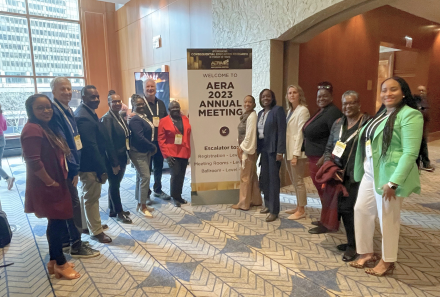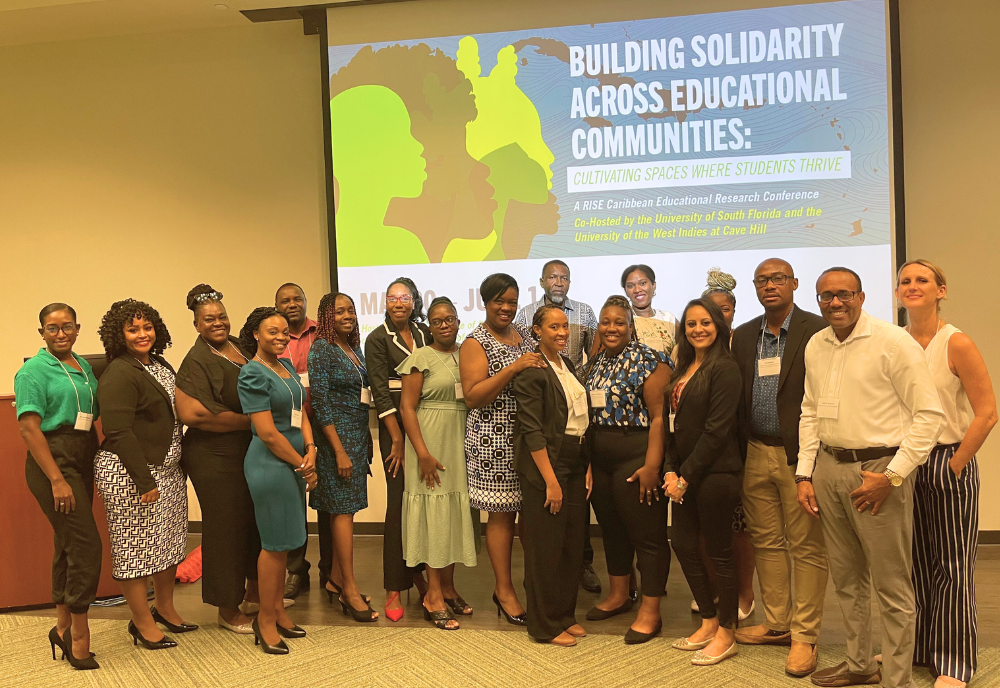Several esteemed USF College of Education faculty members have made a profound international
impact by participating in the Research Initiative for Supporting Education in the
Caribbean, or RISE Caribbean. This initiative, which began in 2021 when Patriann Smith, a then assistant professor in Literacy Studies at the USF College of Education,
along with international partners, secured a $3.6 million grant from the United States
Agency for International Development (USAID), culminated in a RISE Caribbean Conference
held at the USF Patel Center for Global Solutions in 2023.
The RISE Caribbean initiative, a collaborative effort involving the University of
West Indies (UWI) Cave Hill, USF, and other regional and international institutions,
aimed to create a central repository of education data for the Eastern Caribbean and
Barbados, conduct research to inform education policies, and build capacity for research
among students and educational stakeholders. It sought to foster collaborative research
and strengthen the research culture through numerous mechanisms including research
partnerships with practitioners, publications, and public lectures.
A significant step in achieving these goals was the Caribbean Educational Research
Center (CERC), launched on the UWI Cave Hill Campus in Barbados. There, USF faculty
members delivered asynchronous training courses for the CERC in 2021, followed by
two summer institutes in 2022 and 2023 with research fellows in Barbados.
A transnational Cross-Cultural Research Mentorship Network (CCRMN) was also established,
where over 15 research fellows and research assistants worked with seven USF faculty
members on research showcased at the RISE Caribbean Conference. The USF faculty involved
in this initiative included Constance Hines, James King, Robert Dedrick, Deirdre Cobb-Roberts,
Eunsook Kim, Jennifer Wolgemuth, and Jolyn Blank.
“The USF faculty proved to be indispensable to the success of the RISE Caribbean initiative
and to my growth and development as a scholar. The breadth and depth of knowledge
that they each possessed shone through, reflecting the strength of their individual
and collective intellect while also reminding me of the warmth of their hearts,” said
Smith. “It was clear that their devotion, love for the research assistants and fellows,
as well as care and camaraderie for me and for each other across the USF team was
invaluable and that the initiative could not have made such a remarkable impact without
their immense support.”

Group photo of UWI and USF participants at the American Education Research Association 2023 annual meeting.
Several UWI Cave Hill RISE Caribbean research fellows and assistants were invited
to the 2023 and 2024 American Educational Research Association (AERA) conference in
Chicago and Philadelphia respectively alongside their USF faculty research mentors.
There, Smith was asked by Palgrave Macmillan, a world-class publication company, to
write a book about the research-practice partnership. She also collaborated with the
Classroom Caffeine podcast, where faculty and fellows shared information about RISE
Caribbean, further amplifying its impact.
In a culminating event, the RISE Caribbean Education Conference was hosted in 2023
from May 30 to June 1 with a keynote by esteemed professor, Allison Skerrett, University of Texas at Austin and featured presentations by Dominican American educators,
Lorena & Roberto Germán of Multicultural Classroom. Researchers from the Caribbean,
the United States, and the USF College of Education presented over the three-day conference. The USF Anchin Center helped coordinate the conference alongside Rachel and James
Hatten.
“The mentorship received by research assistants and fellows over the three-year period
during which they were deeply engaged in community with USF faculty via the Cross-Cultural
Research Mentorship Network (CCRMN) promises to perhaps be the most instrumental avenue
for continued research transformation in the Eastern Caribbean,” said Smith. “Through
the skills gathered from the initiative, the emerging scholars and educators who now
function as a cadre of researchers equipped to address change based on a legacy of
colonization in the Caribbean region, have the capacity to train other scholars to
use Caribbean epistemologies as a basis for generating research solutions to problems
in the region while also advancing the goals of education as a purpose-filled and
holistic mission.”
“My best takeaway from RISE was the new relationships and friendships with the UWI
community,” said King, a research mentor on the RISE Caribbean initiative, and professor
emeritus at the University of South Florida. “I am continuing to collaborate with
faculty and doctoral students [from UWI] on several research projects.”
The grant period for RISE Caribbean ended officially on March 28, 2024, but this initiative's
impact will continue to live on. For more information about RISE Caribbean, please
contact Patriann Smith.
